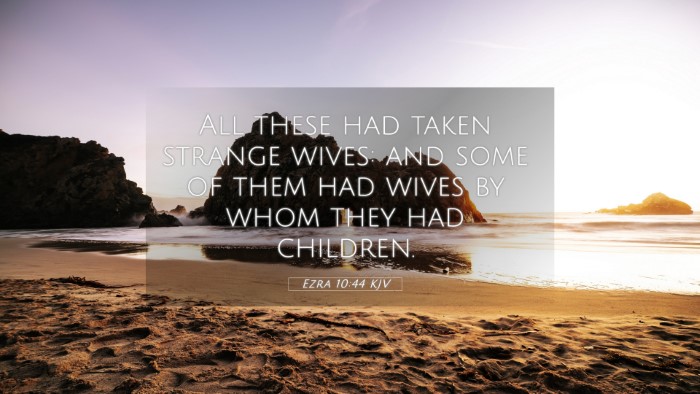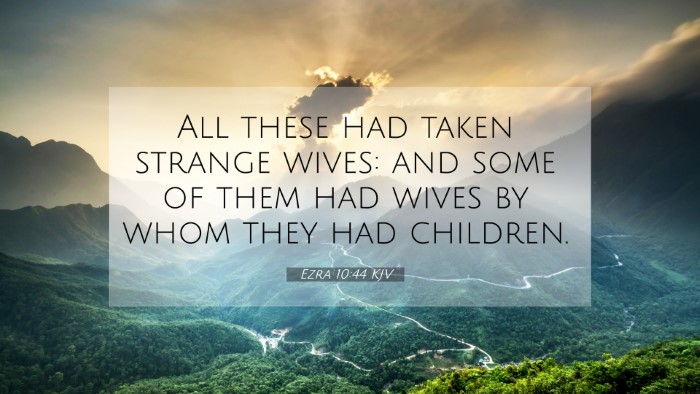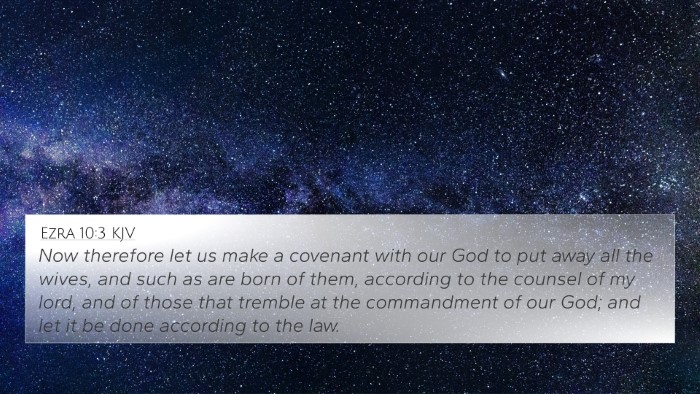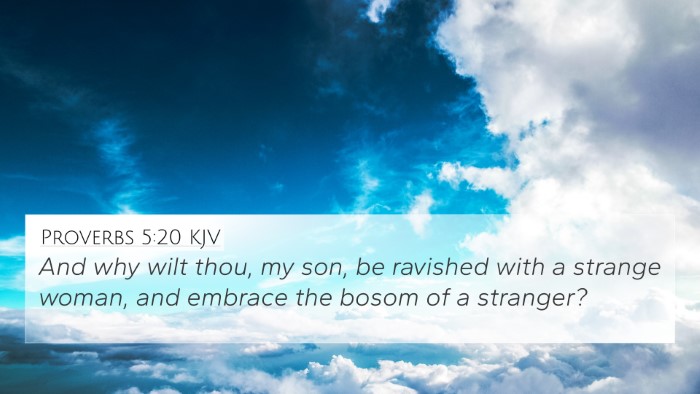Understanding Ezra 10:44
Ezra 10:44 is a significant verse that gives insight into the actions of the returning exiles in the post-exilic community. This verse lists the names of those who had taken foreign wives, which was a critical issue for the Israelites at that time.
Verse Text
Ezra 10:44 (KJV): "All these had taken strange wives: and some of them had wives by whom they had children."
Verse Meaning and Context
This verse falls within a larger narrative concerning the reformative efforts led by Ezra after the return from Babylonian captivity. The Israelites were called to separate themselves from foreign influences, which included intermarriage with surrounding nations. This command stems from the Law of Moses, which cautioned against forming marital alliances that could lead to the worship of foreign gods.
Interpretative Insights
- Matthew Henry: Henry emphasizes the importance of spiritual purity and the dangers of foreign alliances. He reflects on how such unions can lead to the erosion of faith and commitment to God.
- Albert Barnes: Barnes notes that the mention of children in this verse highlights the complexity and emotional weight of the situation. These families created personal and social challenges that had to be addressed.
- Adam Clarke: Clarke contemplates the individuals listed and suggests that their actions were not just individual mistakes, but part of a broader systemic issue affecting the community and their relationship with God.
Thematic Connections
Ezra 10:44 underscores several key themes in Scripture, such as spiritual integrity, community responsibility, and the consequences of disobedience. The verse serves as a warning to remain faithful to God's commandments and the importance of addressing issues within the community.
Cross-References
For a deeper understanding, here are several cross-references that illuminate various aspects of Ezra 10:44:
- Deuteronomy 7:3-4: Warns against intermarriage with foreign nations to prevent spiritual corruption.
- Nehemiah 13:23-27: Discusses Nehemiah's reforms concerning foreign marriages, echoing the themes of Ezra.
- 1 Kings 11:1-4: Presents the downfall of Solomon due to his foreign wives leading him astray.
- Malachi 2:11-12: Addresses the betrayal of the holy covenant through marriage to foreign gods.
- Ezra 9:1-2: Provides the background that led to the reforms mentioned in chapter 10.
- Exodus 34:16: Commands Israel not to give their daughters in marriage to the sons of the surrounding nations.
- 2 Corinthians 6:14: New Testament teachings on being unequally yoked with unbelievers.
- Joshua 23:12-13: Warns Israel about alliances with the remaining nations in the land.
- Isaiah 56:3: Invites foreigners to participate in the covenant, but with focus on faithfulness.
- Psalms 106:34-39: Reflects on Israel's historical tendency to adopt pagan practices through intermarriage.
Conclusion
Ezra 10:44 reflects the challenges faced by the returning exiles in maintaining their identity and faithfulness to God amidst the influences of surrounding cultures. The insights drawn from various commentaries reveal the multifaceted implications of this text, emphasizing the need for vigilance in spiritual matters.
Further Study Suggestions
If you are interested in exploring the themes of Ezra 10:44 further, consider utilizing tools for Bible cross-referencing, such as a Bible concordance or a Bible cross-reference guide. These resources can help identify Bible verses that relate to each other and enhance your understanding of the connections between Bible verses.
How to Use Bible Cross-References
Effective study can involve examining comparative Bible verse analysis for a richer understanding. Dive deeper into the inter-Biblical dialogue between the Old and New Testaments and note how themes are cross-referenced throughout the scriptures.






